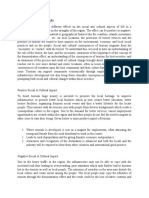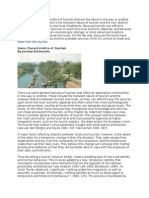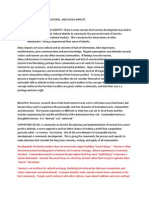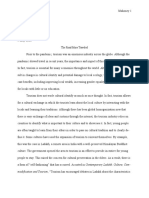International Tourism
International Tourism
Uploaded by
Nguyễn HằngCopyright:
Available Formats
International Tourism
International Tourism
Uploaded by
Nguyễn HằngOriginal Title
Copyright
Available Formats
Share this document
Did you find this document useful?
Is this content inappropriate?
Copyright:
Available Formats
International Tourism
International Tourism
Uploaded by
Nguyễn HằngCopyright:
Available Formats
Nguyen Hang
Nowadays, international tourism is the biggest industry in the world. Unfortunately, international
tourism creates tension rather than understanding between people from different cultures. To what
extent do you agree or disagree?
In this day and age, matters related to the travel industry have never failed to capture public’s interest.
Albeit being of greatest significance to world economy, international tourism is believed to actually be a
source of tension rather than raising multicultural awareness among individuals of distinct cultural
backgrounds. I, personally, subscribe to this idea for the two reasons as follows.
In the first place, international travel restrains the relationships between culturally different nations.
Firstly, promoting overseas tourism provokes inherent conflicts among tourists and local inhabitants.
This is mainly a result of an enormous difference in lifestyles and beliefs as these people are born and
raised in completely dissimilar cultural settings. For instance, a native of Indonesia who practices Islam
may find exceptionally offended seeing the foreign tourists of other religions consuming pork for their
meals. Secondly, increasing popularity of travelling abroad is likely to result in an erosion of original
cultural values. With a view to maximizing profits, the probabilities are that the local residents will
conceal their actual lifestyles and conform to the popular stereotypes just to meet travelers’
expectations.
Additionally, host countries are especially vulnerable in certain facets as an immediate result of
international tourism. First, the promotion of overseas travel puts the local environment at risk, causing
local residents’ outcry. This is attributed to the excessively large population at such tourist attractions,
whose use of energy and water accounts for a sizeable part of national consumption. Apart from this, in
order to attract visitors, the construction of hotels or recreational centers are absolutely necessary, yet
at the direct expense of the local natural resources. Besides, a massive influx of overseas travelers
triggers the social security of host nations. Visitors from foreign countries are generally perceived to be
partly to blame for the increasing number of petty thieves and criminals. To this end, some local
businesses in countries like Japan have even introduced regulations restricting Vietnamese people for
their notorious reputation.
In conclusion, I wholeheartedly gravitate to the view highlighting the tension created among culturally
distinct citizens due to international tourism on the grounds that it provokes unresolved conflicts and
puts host nations in jeopardy.
You might also like
- Look AheadDocument3 pagesLook AheadMin Min Mit80% (5)
- Sample For Writing Task 1Document2 pagesSample For Writing Task 1Nguyễn HằngNo ratings yet
- Test-Correction Test No 33Document7 pagesTest-Correction Test No 33Nguyễn HằngNo ratings yet
- Essay 8Document2 pagesEssay 8Bùi Thanh Ngọc BíchNo ratings yet
- International tourismDocument1 pageInternational tourismdhmyanh20No ratings yet
- TOURISMDocument21 pagesTOURISMtruongtuyetminh18No ratings yet
- Traditional Tourism Brings No Adverse Environmental Effects For Local CommunitiesDocument4 pagesTraditional Tourism Brings No Adverse Environmental Effects For Local CommunitiesBárbara Francisca Ravanal RodríguezNo ratings yet
- 12 TourismDocument8 pages12 TourismGisselyNo ratings yet
- TourismDocument1 pageTourismHatcafeNo ratings yet
- Mat Clark - Writing EssayDocument138 pagesMat Clark - Writing Essayellenlion100% (2)
- Travel and Transport Advantages and DisadvantagesDocument3 pagesTravel and Transport Advantages and DisadvantagesYaroslava SokurNo ratings yet
- Ielts WritingDocument213 pagesIelts WritingNguyệt ÁnhNo ratings yet
- Travelling, Industry, Ist Pros and Cons, ConclusionDocument8 pagesTravelling, Industry, Ist Pros and Cons, ConclusionTomáš PokludaNo ratings yet
- Impact of Tourism On The DestinationDocument7 pagesImpact of Tourism On The DestinationMogomotsiNo ratings yet
- Mat Clark - Writing EssayDocument195 pagesMat Clark - Writing EssayQuynhGiao Nguyen Ta100% (1)
- Macro Module 2Document24 pagesMacro Module 2Nitsua Maidun AttolbaNo ratings yet
- Cac Bai Viet Mau Task 2 Thi IeltsDocument132 pagesCac Bai Viet Mau Task 2 Thi Ieltsʚɞ Kwon Boa ʚɞNo ratings yet
- TASK 2- MODEL OF ADVANTAGES AND DISADVANTAGESDocument1 pageTASK 2- MODEL OF ADVANTAGES AND DISADVANTAGESRuǎn Ying ShūNo ratings yet
- Mat Clark - Writing EssayDocument132 pagesMat Clark - Writing Essaysvetikk200050% (2)
- Travel and Transport Advantages and DisadvantagesDocument3 pagesTravel and Transport Advantages and DisadvantagesYaroslava SokurNo ratings yet
- TourismDocument1 pageTourism19Quỳnh Nhi Ngô - 9.11No ratings yet
- International Traveling Band 8.0Document1 pageInternational Traveling Band 8.0itsbncdbNo ratings yet
- TOURISMDocument1 pageTOURISM19Quỳnh Nhi Ngô - 9.11No ratings yet
- Task 2: Travel Professors: Travel Professor Investigates: The Socio-Cultural Impacts of TourismDocument4 pagesTask 2: Travel Professors: Travel Professor Investigates: The Socio-Cultural Impacts of TourismADY100% (1)
- The Impact of Tourism On Culture and CommunitiesDocument3 pagesThe Impact of Tourism On Culture and CommunitiesKaty BobocNo ratings yet
- Writing Task 2 (Text)Document164 pagesWriting Task 2 (Text)Trần HươngNo ratings yet
- Socio-Cultural Impacts of TourismDocument3 pagesSocio-Cultural Impacts of TourismMia Sam0% (1)
- Reflection Paper About Tourism ImpactsDocument5 pagesReflection Paper About Tourism ImpactsRenz John AgcaoiliNo ratings yet
- Essay-Organized Tour To Remote Areas and CommunityDocument2 pagesEssay-Organized Tour To Remote Areas and CommunityLe Anh Phuong ThuyNo ratings yet
- Tourism EffectsDocument5 pagesTourism EffectsGabrielė VirbašiūtėNo ratings yet
- Social Impacts of TourismDocument6 pagesSocial Impacts of TourismRaney Oldan100% (1)
- International tourism has brought enormous benefit to many placesDocument2 pagesInternational tourism has brought enormous benefit to many placesthuydungglikeboNo ratings yet
- 4. adnvatage far outweight disadvantageDocument1 page4. adnvatage far outweight disadvantagequanganhhoangluuNo ratings yet
- task 2 day 5Document1 pagetask 2 day 5Lan Yên Trần ĐìnhNo ratings yet
- Writing EssayDocument157 pagesWriting EssaySenthamarai SanniasiNo ratings yet
- Tourism: According To WTO (1993) " Tourism Encompasses The Activities of PersonsDocument10 pagesTourism: According To WTO (1993) " Tourism Encompasses The Activities of PersonsMuhammad ArradhiNo ratings yet
- 5 Gawler Impacts TourismDocument3 pages5 Gawler Impacts TourismAnurag MauryaNo ratings yet
- A lot of places in the world rely on tourism as a main source of incomeDocument1 pageA lot of places in the world rely on tourism as a main source of incometai nguyenNo ratings yet
- About Tourism IndustryDocument7 pagesAbout Tourism IndustryHyung BaeNo ratings yet
- Nowadays many people travel to foreign countries for pleasureDocument2 pagesNowadays many people travel to foreign countries for pleasureNguyễn Hoàng Vân AnhNo ratings yet
- Impact of TourismDocument5 pagesImpact of TourismAngel Grace LargoNo ratings yet
- Ielts Essay Sample For WTDocument110 pagesIelts Essay Sample For WTJasmeen MatharuNo ratings yet
- Tourism Brings Negative Cultural and Social ImpactsDocument3 pagesTourism Brings Negative Cultural and Social ImpactsAnonymous rfeqISNo ratings yet
- Section7 ImpactsofTourismDocument11 pagesSection7 ImpactsofTourismFlorrie Jhune BuhaweNo ratings yet
- 3 EssaysDocument4 pages3 EssaysIrfan AshrafNo ratings yet
- English - Pro & Cons International TourismDocument45 pagesEnglish - Pro & Cons International TourismSergiu SergeNo ratings yet
- 26. Tourisim Dang LamDocument2 pages26. Tourisim Dang LamvivuangiangsiteNo ratings yet
- In Developing CountriesDocument3 pagesIn Developing CountriesQuốc Huy NguyễnNo ratings yet
- Sinteză CapitolDocument2 pagesSinteză Capitolboloca.danielNo ratings yet
- Mat Clark Writing SamplesDocument131 pagesMat Clark Writing SamplesDamoon NaderiDarjaziniNo ratings yet
- 1) in What Ways Can Tourism Contribute To The Economic Development of A Country? (You Can Choose 1 or More Than One Country To Answer ThisDocument4 pages1) in What Ways Can Tourism Contribute To The Economic Development of A Country? (You Can Choose 1 or More Than One Country To Answer ThisbalanishanaNo ratings yet
- Tourism in Fiji: How It's Making The Rich Even Richer, and The Poor Even PoorerDocument5 pagesTourism in Fiji: How It's Making The Rich Even Richer, and The Poor Even PoorerIntelligentsiya HqNo ratings yet
- Essay - Culture HeritageDocument1 pageEssay - Culture HeritageĐào Nhật HiểnNo ratings yet
- MODULE.1 PT 1docxDocument12 pagesMODULE.1 PT 1docxCatarina RodriguesNo ratings yet
- Understanding The World of TourismDocument6 pagesUnderstanding The World of TourismSara Batool100% (1)
- Elc 550 Format Term Paper Group 4 Namaf7a FinalDocument9 pagesElc 550 Format Term Paper Group 4 Namaf7a FinalieyraNo ratings yet
- Ap Lit Capstone Final Written ComponentDocument7 pagesAp Lit Capstone Final Written Componentapi-446912941No ratings yet
- Worldwide Travel : A Legal Knowledge Guide An Effective Travel Guide to Avoid Legal Problems in Countries Across the Globe: Costa Rica, Cuba, Brazil, Uruguay Vol IFrom EverandWorldwide Travel : A Legal Knowledge Guide An Effective Travel Guide to Avoid Legal Problems in Countries Across the Globe: Costa Rica, Cuba, Brazil, Uruguay Vol INo ratings yet
- The Ultimate Career Guide in the Tourism and Hospitality Industry: 1, #1From EverandThe Ultimate Career Guide in the Tourism and Hospitality Industry: 1, #1No ratings yet
- Day 12 TeacherDocument6 pagesDay 12 TeacherNguyễn HằngNo ratings yet
- Column Hound Lampoon Pack Recluse Scoop Slander StalkDocument8 pagesColumn Hound Lampoon Pack Recluse Scoop Slander StalkNguyễn HằngNo ratings yet
- NewsDocument1 pageNewsNguyễn HằngNo ratings yet
- UNIT 1 KeyDocument2 pagesUNIT 1 KeyNguyễn HằngNo ratings yet
- UNIT 4 KeyDocument2 pagesUNIT 4 KeyNguyễn HằngNo ratings yet
- Key Minitest 11Document2 pagesKey Minitest 11Nguyễn HằngNo ratings yet
- KeyDocument5 pagesKeyNguyễn HằngNo ratings yet
- Check Test 60 TeacherDocument2 pagesCheck Test 60 TeacherNguyễn HằngNo ratings yet
- Rewrite Introduction + ConclusionDocument2 pagesRewrite Introduction + ConclusionNguyễn HằngNo ratings yet
- Writing - Nguyen Quynh AnhDocument3 pagesWriting - Nguyen Quynh AnhNguyễn HằngNo ratings yet
- Trư NG THPT Chuyên Biên Hòa: S Giáo D C Và Đào T o Hà NamDocument2 pagesTrư NG THPT Chuyên Biên Hòa: S Giáo D C Và Đào T o Hà NamNguyễn HằngNo ratings yet
- Eg: - Rigorous - Analysis/ Detail Vs - Rigorous - StandardDocument1 pageEg: - Rigorous - Analysis/ Detail Vs - Rigorous - StandardNguyễn HằngNo ratings yet
- Preparation For Nec 2021-No 27 ListeningDocument2 pagesPreparation For Nec 2021-No 27 ListeningNguyễn HằngNo ratings yet
- Preparation For Nec 2021-No 37 I. Minitest Online - No 6 Part 1. Choose The Best AnswerDocument3 pagesPreparation For Nec 2021-No 37 I. Minitest Online - No 6 Part 1. Choose The Best AnswerNguyễn HằngNo ratings yet
- Repossess Splash Median Serve Spare Aggregate Draw So Much Tout DifferentialDocument2 pagesRepossess Splash Median Serve Spare Aggregate Draw So Much Tout DifferentialNguyễn HằngNo ratings yet
- Preparation For Nec 2021-No 29 LISTENING 16/25Document4 pagesPreparation For Nec 2021-No 29 LISTENING 16/25Nguyễn Hằng100% (1)
- Ding'& Of: English......... (l72lDocument17 pagesDing'& Of: English......... (l72lNguyễn HằngNo ratings yet
- Essay 2 - Consumer HabitDocument1 pageEssay 2 - Consumer HabitNguyễn HằngNo ratings yet
- Flight Ticket PDF Download(1)Document1 pageFlight Ticket PDF Download(1)mghalwash5No ratings yet
- Sunil Chauhan Resume 2023Document3 pagesSunil Chauhan Resume 2023Su ChNo ratings yet
- Mehdiapatnam - Uppal: 113I/M Bus Time Schedule & Line MapDocument3 pagesMehdiapatnam - Uppal: 113I/M Bus Time Schedule & Line Mapsarithab613No ratings yet
- Hotel Booking EnquiryDocument6 pagesHotel Booking EnquiryAimers EducationNo ratings yet
- Mikko Perez - WEB BlogDocument2 pagesMikko Perez - WEB BlogMikko B. PerezNo ratings yet
- Tiếng Anh 9 i-Learn Smart World - Luyện tập - Unit 4Document4 pagesTiếng Anh 9 i-Learn Smart World - Luyện tập - Unit 4Nguyễn Thị Khánh LinhNo ratings yet
- Challenges For Urban Conservation of Core Area in Pilgrim Cities of India-1Document7 pagesChallenges For Urban Conservation of Core Area in Pilgrim Cities of India-1Sanu KadamNo ratings yet
- Annexure A-Blank FORM For Licenses and IR RenewalDocument4 pagesAnnexure A-Blank FORM For Licenses and IR Renewalabhishesh pandeyNo ratings yet
- Sightseeing Pass Leaflet New YorkDocument7 pagesSightseeing Pass Leaflet New YorkVivianNo ratings yet
- Homework N 10 Ask About Someone S VacationDocument3 pagesHomework N 10 Ask About Someone S VacationAndres GavilanezNo ratings yet
- Electronic TicketDocument2 pagesElectronic TicketManuel GuzmanNo ratings yet
- Hotel (1)Document6 pagesHotel (1)Reema AhmedNo ratings yet
- Rizal Group 1Document126 pagesRizal Group 1Alayna NasrodinNo ratings yet
- IRCTC MahakumbDocument6 pagesIRCTC MahakumbVenkat RaoNo ratings yet
- Application For Leave of Absence Form - V5Document2 pagesApplication For Leave of Absence Form - V5Mirzea DanielNo ratings yet
- 12618/mngla LKSDP Exp Sleeper Class (SL)Document3 pages12618/mngla LKSDP Exp Sleeper Class (SL)kkcp830No ratings yet
- Vietnam v2 (Version 1)Document13 pagesVietnam v2 (Version 1)Vipula RaiNo ratings yet
- Travel Reservation December 28 For KARNATIDocument3 pagesTravel Reservation December 28 For KARNATIlucky6519No ratings yet
- Ryanair Case AnalysisDocument2 pagesRyanair Case AnalysisEmilyNo ratings yet
- Ticket & Receipt: Your Travel InformationDocument3 pagesTicket & Receipt: Your Travel InformationSiva SenthilNo ratings yet
- SPEECHDocument2 pagesSPEECHlhyn JasarenoNo ratings yet
- Domestic Tour ItineraryDocument5 pagesDomestic Tour ItineraryJoyceees VillacruelNo ratings yet
- 2019 2Q TPB PDFDocument11 pages2019 2Q TPB PDFMoon zel100% (1)
- 12969-Cbe Jaipur Exp Third Ac (3A) : Start Date 22-Dec-2023 Arrival 06:45 24-Dec-2023Document1 page12969-Cbe Jaipur Exp Third Ac (3A) : Start Date 22-Dec-2023 Arrival 06:45 24-Dec-2023sharesth sharmaNo ratings yet
- l3h Indigo-Program RG 111123Document2 pagesl3h Indigo-Program RG 111123sudhanshu singhNo ratings yet
- Schengen Visa Photograph RequirementsDocument6 pagesSchengen Visa Photograph RequirementsF and L Travellers HubNo ratings yet
- L'ACCÈS Internationale Co.: Internship ReportDocument27 pagesL'ACCÈS Internationale Co.: Internship ReportAyesha awanNo ratings yet
- IT77TR Application For Registration Trust External FormDocument7 pagesIT77TR Application For Registration Trust External FormBrandon BothaNo ratings yet
- Andaman - 5 Night & 6 Days ItineraryDocument4 pagesAndaman - 5 Night & 6 Days ItineraryAkash ToursNo ratings yet













































































































